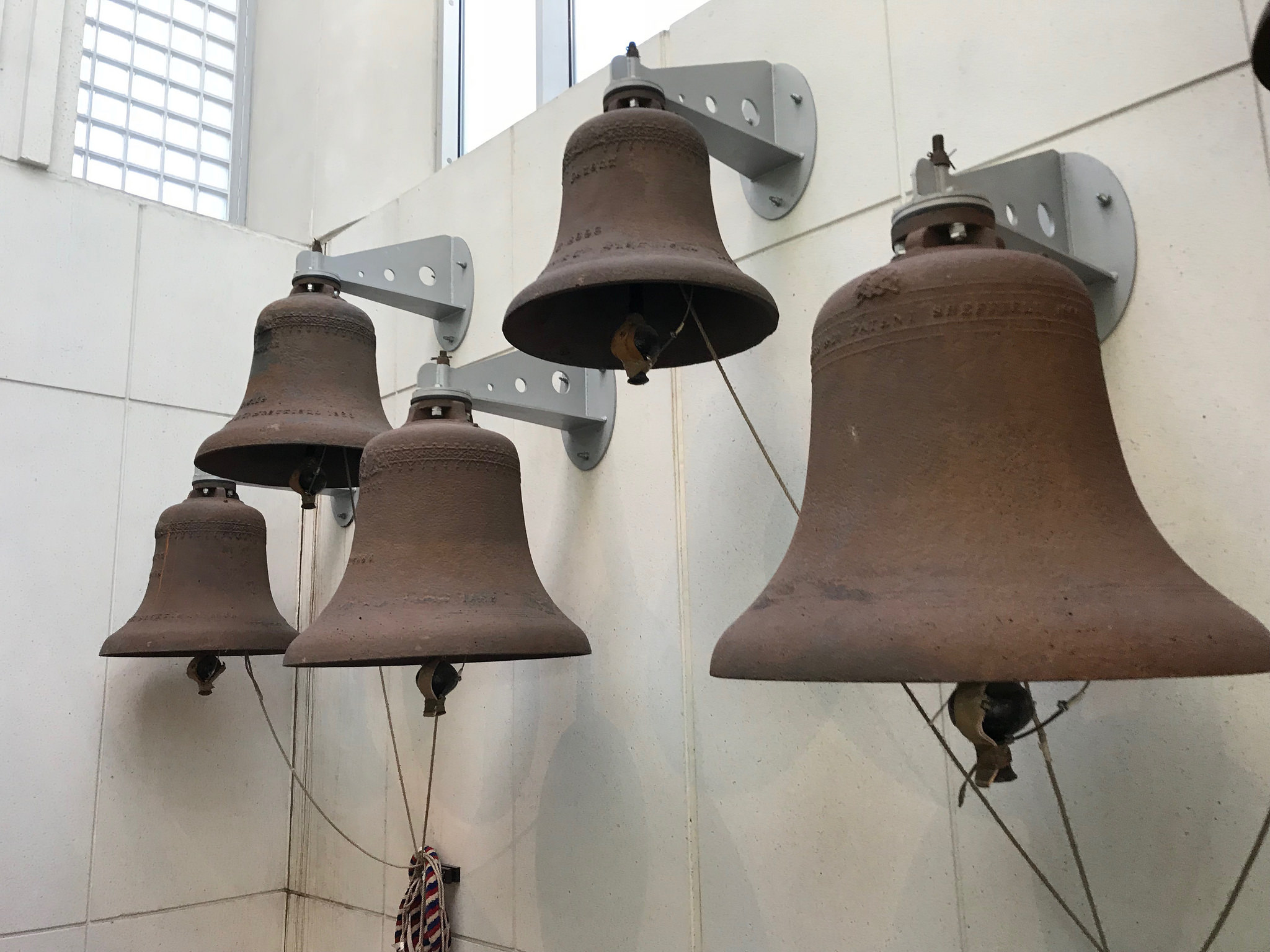
This is the fourth of five weeks that the Revised Common Lectionary spends ringing the changes on John 6, where Jesus proclaims that he is the Bread of Life — though in this particular excerpt he sticks to saying he is
the living bread that came down from heaven.” (John 6:51 NRSV)
Ringing the Changes
The phrase “ring the changes” seems apt to me: it comes from the English tradition of ringing church bells in carefully calculated sequences or “changes,” each one including the full range of available bells in a varying pattern.
Here’s a simple made-up example for a church with five bells of different notes. Ring them in this order:
12345
13245
13425
13452
21345
See how the pattern changes the placement of bell number two?
(To learn more than you need to know about the practice in a classic mystery novel, check out Dorothy L. Sayers’ The Nine Tailors, featuring Lord Peter Whimsey. Seriously. She’s awesome.)
So Jesus is “ringing the changes.” Here and elsewhere in the chapter Jesus seems to say the same group of things:
- He is the bread of life.
- He is the bread that came down from heaven.
- This bread is his body.
- Everyone needs to eat this bread.
Stuff like that.
The ideas stay the same but the arrangement keeps changing.
John 6:51-58
Unlike the tradition of ringing the changes on bells, however, in John 6:51-58 Jesus actually keeps sneaking new elements into the sequence.
Those additions are the promises Jesus is making about the Bread of Heaven.
And if you are influenced by such teachers as Luther and Calvin, you know that you should pay careful attention to Christ’s promises. Saving faith in Jesus amounts to trusting him — trusting that the promises he gives are true.
In John 6:51-58 the promises fall into three groups.
1. Eternal Life
In this particular passage the framing promise is eternal life.
It opens with the promise that anyone eating this bread
…will live for ever…” (John 6:51 & 58 NRSV)
In the middle there is the slightly different phrasing of the promise that one eating this bread will
…have eternal life, and I will raise them up on the last day…” (John 6:54 NRSV)
Then it closes with the same promise as at the beginning: Anyone eating this bread
…will live for ever…” (John 6:51 & 58 NRSV)
Because of this framing it seems to be the main promise — but the frame is artificial.
This is not really a passage unto itself, with that promise at the beginning at the end. John 6:51-58 is the lectionary’s nearly random slice of a too-long-for-one-Sunday-morning story.
It also sounds central because of the cultural weight of the afterlife in American Christianity.
Whether it is your personal issue or not, as a culture we are almost obsessed with the question of whether we are going to heaven or hell, to eternal life or to damnation. Whole evangelistic campaigns, whole denominations, rest on that question.
So we are prone to read this passage and glom onto that promise about everlasting life and let it sort of wash into what we see elsewhere in the passage. If that’s all we see, it’s probably all we will preach.
But if everlasting life is all we preach, we are going to see a lot of eyes glaze over.
That’s because for a lot of people the question feels irrelevant. Don’t believe me? Ask around. Ask some non-Christians. Tell them you aren’t going to try to pressure them into anything — you just want to know how important living forever is in their personal viewpoint. Let me know the results.
Neither the threat of damnation nor the promise of everlasting life are getting a lot of traction in evangelism these days.
Don’t get me wrong — it is an important enough question. There’s a lot of biblical material to explore on it. But I think it is worth noting that the offer of everlasting life is not the only thing Jesus is talking about here — or elsewhere.
2. Life Within You
So what else is Jesus promising in this passage? Take a look at verse 53:
Very truly, I tell you, unless you eat the flesh of the Son of Man and drink his blood, you have no life in you.” (John 6:53 NRSV)
That promise is not about life after death. That’s about life right now.
Jesus is working with the idea that you and I can be technically alive while somehow walking around without any “life” in us.
That’s worth meditating on.
What kind of being goes wandering around the neighborhood without any actual “life” inside?

You got it: Zombies.
The “undead.” They are a multi-million dollar industry in Hollywood, and have been for years. Zombies, people with no actual life in them, are among our primal fears.
We don’t want to meet them.
And honestly, when it comes to primal fears, meeting them isn’t the real problem.
We don’t want to BE them.
We are afraid, deep down inside, that maybe we ARE them.
So take it one step further: What is being symbolized in all these Zombie shows?
What do I fear becoming, if I fear being alive with no actual life in me?
- I fear that my existence is meaningless.
- I fear that my daily life is more like a walking death.
If this is a fear that dominates popular media, then Jesus’ promise has a place to land.
It comes into sharpest relief for people with addictions: they eventually hit bottom, realize that something deadly has taken over and they are out of control. They need life inside.
But it is also there waiting to be seen for those of us with ordinary middle class problems.
Like our obsession with our Facebook newsfeed. We look with pleasure or outrage at the latest comments on the latest news, or we look with envy at someone who’s life seems to be so glorious — and afterward we feel dead inside.
I’ll tell you, since I left my faculty position, I get far fewer emails — but I check my accounts many times a day. I go looking for the tiny emotional hit of seeing a message from someone I know, some opportunity, some offer — and afterward I feel dead inside.
Jesus offers, instead, that with him we will have life inside. Without him? Not so much.
I want that Bread of Life. I want to have life inside me.
Who wants to be a zombie?
3. Union With Christ
This second promise, of life within us instead of death, should prompt us to ask how to get it. That, I think, is what we find in the third promise.
Those who eat my flesh and drink my blood abide in me, and I in them.” (John 6:56 NRSV)
Aha! The practical point, the one that becomes easier to imagine, is that receiving Christ as Bread of Life, we find ourselves in what is called “union with Christ.”
He’s foreshadowing two things here.
First, he foreshadows John 15, where he says a lot more about “abiding” with him as “branches” in the “Vine.” But here, just in passing, he makes “abiding” the consequence of his being Bread of Life. We eat the bread — and then we are physically united to the bread.
The second thing he foreshadows is the Last Supper, where he gives us the Eucharist, the Bread and Wine which he says are his Body and Blood. By physically eating and drinking them, we are spiritually united to him.
Eat this Bread of Life, be united to Jesus, and then you really will have his life within you.
Or as Jesus put it,
…so whoever eats me will live because of me.” (John 6:57 NRSV)
That promise deserves a world of attention.
In my experience it is not so easy as just “Ask Jesus into your heart, then every day you feel his life bubbling up inside.”
Rather there are a thousand decisions a day to choose the Bread of Life.
I need to choose Jesus instead of the internet, or whatever else obsesses.
There are individual processes to nurture, like a rich and active prayer life where I feed by faith on Jesus as Bread.
There are corporate process too, like an active life in the Church where I can receive his Body and Blood in the Eucharist.
But day by day, minute by minute, I need to choose Jesus — in the words of the Book of Common Prayer, to “feed on him in my heart by faith.”
++++++++++++
I’d love to send my Monday Meditations, as well as my other new articles and announcements, straight to your inbox. Just scroll down to the black box with the orange button to subscribe to my weekly(ish) newsletter.
I’m planning to put together a new class on prayer this fall — a great way to renew your prayer life in a season we all think of as a time of fresh starts. Watch my blog for news (or subscribe and you’ll hear by email.
This post contains an affiliate link.

Thanks Gary. This spoke to me and I appreciate your writing ministry. God bless! Kristy Parker
Thanks Kristy!
Sorry your comment was stuck awaiting approval for a couple days. We were out of town.
Hope you are doing well and I so appreciate your affirming words.
Blessings,
Gary